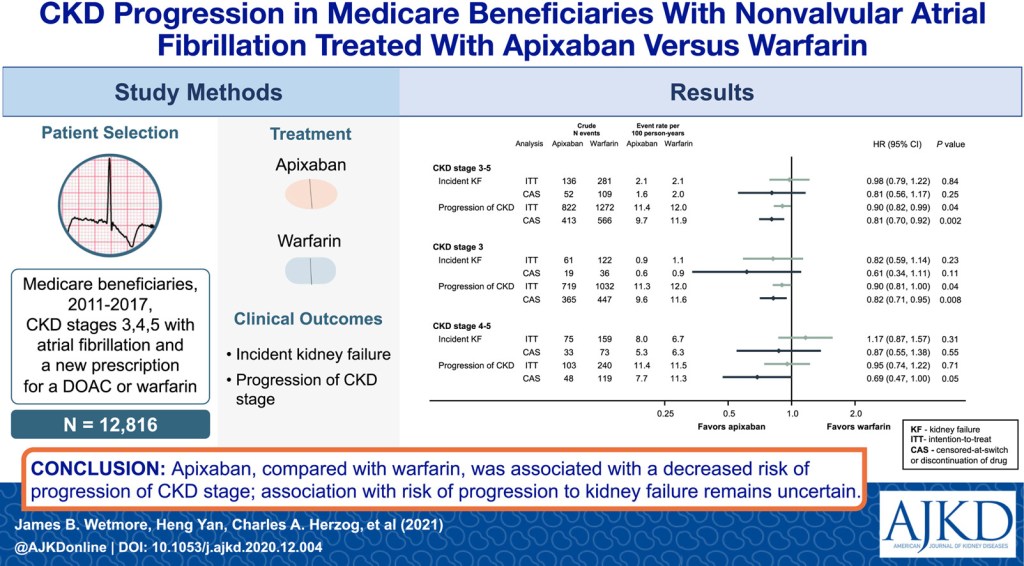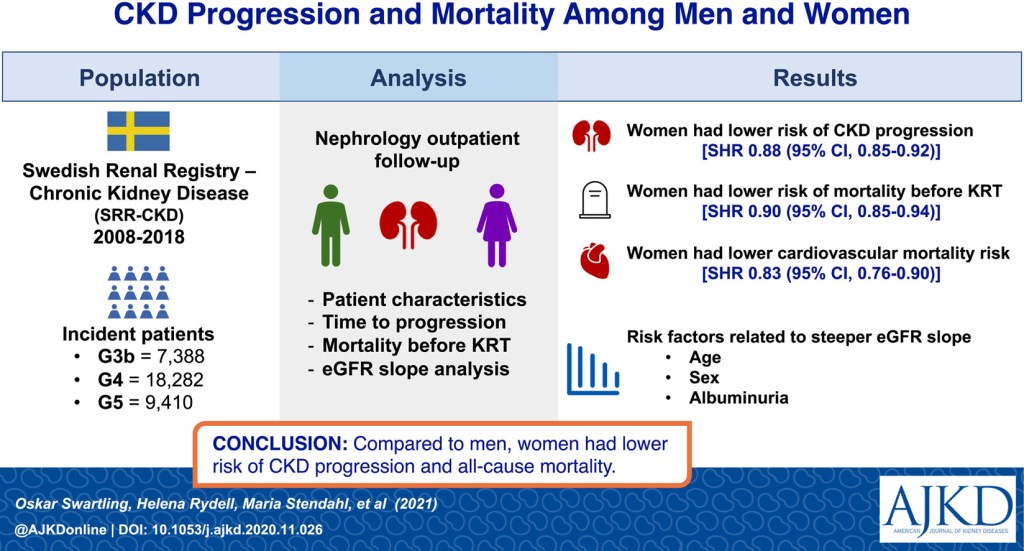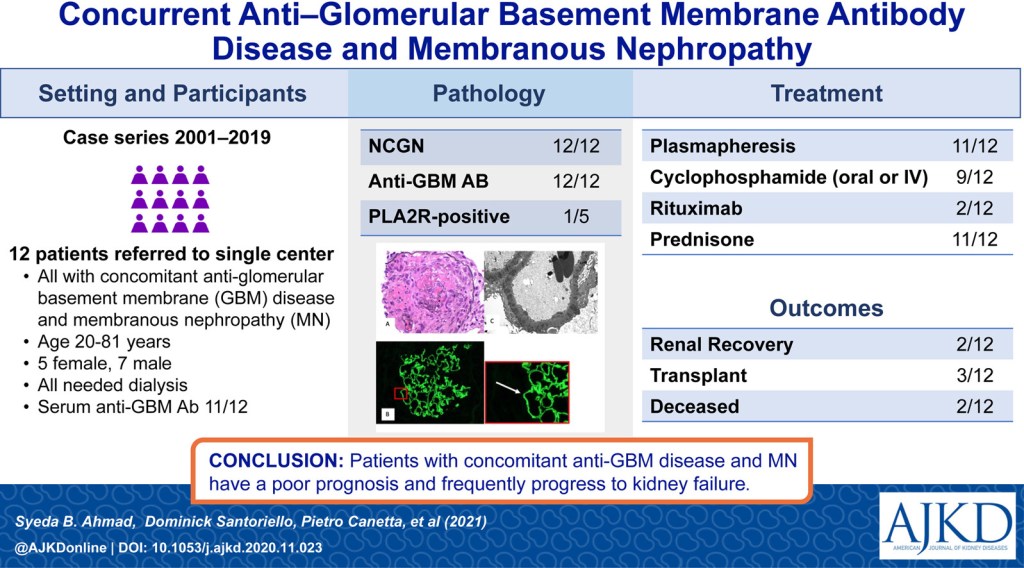Highlights from the August 2021 Issue
Editor’s Note: We asked authors of Original Investigations to provide short plain-language summaries that would briefly summarize what inspired their study, the basic approach taken, what was learned, and why it matters. We hope our readers will find this valuable in helping them keep up with the latest research in the field of nephrology. From the August 2021 issue:
CKD Progression in Medicare Beneficiaries With Nonvalvular Atrial Fibrillation Treated With Apixaban Versus Warfarin by James B. Wetmore et al
From the authors: Warfarin may be injurious to kidney health. We hypothesized that, in patients with CKD and atrial fibrillation, apixaban, a direct oral anticoagulant, would be associated with a lower risk of worsening of CKD and development of kidney failure than warfarin. Using data from Medicare and weighted regression to control for differences between groups in known characteristics, we compared patients using apixaban with those using warfarin. We found that apixaban was associated with a lower risk of worsening of CKD stage than warfarin. Apixaban may be less harmful to kidney health than warfarin, making it a potentially attractive treatment option in older patients with CKD and atrial fibrillation, but more clinical trial data are needed.
DOI: 10.1053/j.ajkd.2020.12.004
Editorial: Is Warfarin Being Relegated to the Pharmaceutical Dustbin? by Ziv Harel and Manish M. Sood [FREE]
CKD Progression and Mortality Among Men and Women: A Nationwide Study in Sweden by Oskar Swartling et al [Open Access]
From the authors: Women are overrepresented in the early chronic kidney disease (CKD) population. Recent evidence has found sex-specific differences in CKD progression and mortality. However, those studies have mostly been general population cohorts or smaller risk cohorts. The present study used a national CKD registry in Sweden that included all nephrology outpatient visits from 2008-2018 with CKD stages 3b-5. Women were found to be less likely to progress by 1 CKD stage or start kidney replacement therapy, and had a slower loss of eGFR per year, with differences also in primary renal diagnoses. In addition, women overall had lower all-cause and cardiovascular mortality. Understanding sex differences in CKD outcomes are central for kidney disease planning and prevention.
DOI: 10.1053/j.ajkd.2020.11.026
Editorial: Do Sex and Gender Matter in Kidney and Cardiovascular Disease? by Sofia B. Ahmed and Sandra M. Dumanski [FREE]
Sex Differences in Cardiovascular Outcomes in CKD: Findings From the CRIC Study by Stephanie M. Toth-Manikowski et al
From the authors: In this multicenter, prospective, longitudinal cohort study of 3,939 adults with chronic kidney disease (CKD), the rates of cardiovascular events and death were high. Compared with men, women were less likely to experience atherosclerotic events, incident heart failure, and death from cardiovascular or other causes. These findings remained statistically significant after adjusting for important sociodemographic factors, clinical characteristics, and cardiac and inflammation biomarkers. Although women with CKD are less likely to experience cardiovascular events and death compared with men with CKD, they are at high risk for these events.
DOI: 10.1053/j.ajkd.2021.01.020
Editorial: Do Sex and Gender Matter in Kidney and Cardiovascular Disease? by Sofia B. Ahmed and Sandra M. Dumanski [FREE]
Assessing the Relationship Between Serum Urate and Urolithiasis Using Mendelian Randomization: An Analysis of the UK Biobank by Ravi K. Narang et al
From the authors: An association between serum urate level and urinary system stones has been previously reported in multiple observational studies, but these are subject to residual confounding. Mendelian randomization is a statistical genetics technique that permits cause and effect to be disentangled in the presence of confounding. In the UK Biobank resource, which includes 359,827 participants, we implemented Mendelian randomization and found no causal effect of serum urate level on stones. This suggests that serum urate does not play a causal role in the pathogenesis of stones and that previously reported associations between serum urate and stones were due to residual confounding.
DOI: 10.1053/j.ajkd.2020.11.018
Concurrent Anti–Glomerular Basement Membrane Antibody Disease and Membranous Nephropathy: A Case Series by Syeda B. Ahmad et al
From the authors: Anti–glomerular basement membrane (GBM) disease is a rapidly progressive glomerulopathy that can occur in conjunction with membranous nephropathy on rare occasions. Our aim was to characterize patients with this clinical presentation and describe their outcomes. We examined the kidney pathology database at Columbia University Medical Center from 2001-2019 and found 12 such cases. Treatment was largely focused on anti-GBM disease and was heterogeneous. Kidney disease outcomes were poor, with most patients requiring kidney replacement therapy (eg, maintenance dialysis or transplantation).
DOI: 10.1053/j.ajkd.2020.11.023
Association Between Kidney Clearance of Secretory Solutes and Cardiovascular Events: The Chronic Renal Insufficiency Cohort (CRIC) Study by Yan Chen et al
From the authors: The kidneys eliminate retained toxins by 2 mechanisms: glomerular filtration and tubular secretion. Yet, current assessment of kidney function is based primarily on measurements of glomerular filtration. We developed a novel procedure to measure kidney tubular secretory clearance. We estimated this kidney function in a national cohort study of patients with chronic kidney disease (CKD). We found that lower kidney clearances of secretory solutes was associated with greater risks of incident heart failure and myocardial infarction but not stroke, over long-term follow-up. However, these associations were removed by adjustment for the estimated glomerular filtration rate. These findings suggest that tubular secretory clearance provides little additional information about the development of cardiovascular disease beyond glomerular measures in mild-to-moderate CKD.
DOI: 10.1053/j.ajkd.2020.12.005
Quantifying Risk Tolerance Among Potential Living Kidney Donors With the Donor-Specific Risk Questionnaire by Carrie Thiessen et al [Open Access]
From the authors: Living kidney donor acceptance and understanding of the risk of kidney failure is essential to informed consent and transplant center decisions about donor eligibility. Using a novel visual aid, we assessed the maximum level of risk of kidney failure that potential living kidney donors were willing to accept. Most respondents accepted more than the known chance of developing kidney failure. Individuals who felt closer to their intended recipients accepted higher levels of risk. Interviews revealed key reasons associated with preference for higher and lower levels of risk. Our results can enhance transplant centers’ ability to educate donors and to engage donors in patient-centered discussions about risk to enhance informed decision making.
DOI: 10.1053/j.ajkd.2020.11.028
Nonesterified Fatty Acids and Kidney Function Decline in Older Adults: Findings From the Cardiovascular Health Study by Carl P. Walther et al
From the authors: Circulating nonesterified fatty acids (also called free fatty acids), substances in the blood derived from food and from the body’s metabolism, are important energy sources for the kidneys and other organs. However, they could cause injury to organs if their levels are too high. We investigated whether high levels were associated with worsened kidney function over the long term. We did not find that high levels were associated with worsened kidney function, after other things that affect kidney function (such as diabetes and arterial disease) were adjusted for. This may be because certain types of nonesterified fatty acids may be harmful to the kidneys while others may be protective.
DOI: 10.1053/j.ajkd.2020.11.030
Policy Forum Editorial from the August 2021 Issue:
Inpatient Dialysis Services: Nephrologist Leadership and Improving Quality and Safety by Kamyar Kalantar-Zadeh et al [FREE]
From the authors: Despite the high level of complexity of inpatient dialysis therapies, currently there is no CMS or other governing body regulation that describes the qualifications and responsibilities for physician leadership oversight for kidney replacement therapy (KRT) performed in hospitalized patients. The heterogeneity of presentations of patients requiring dialysis therapies in hospitals, the acuity level of such patients, and the complexity of available KRT modalities mandate a well-functioning inpatient dialysis therapy service, with a high level of expertise, led and staffed by qualified personnel. We believe that inpatient dialysis services should function under the oversight of qualified physician leader, specifically a qualified and experienced nephrologist, with defined areas of responsibility and accountability related to quality assurance and safe practice of dialysis and hemofiltration therapies.
DOI: 10.1053/j.ajkd.2021.03.011
 On the Cover: Sexual dimorphism in nature can be dramatic. Take, for example, the case of the eclectus parrot; when European ornithologists first came across these beautiful birds, they believed the males and females to be 2 distinct species. While humans may not display such dramatic differences between the sexes, men and women may experience dissimilar rates of CKD progression and CKD-related outcomes. These issues are questions explored in 3 pieces published in this month’s issue of AJKD: Swartling et al explore CKD progression and mortality among men and women in Sweden, Toth-Manikowski et al investigate differences in cardiovascular outcomes, and Ahmed & Dumanski discuss the implications of these findings.
On the Cover: Sexual dimorphism in nature can be dramatic. Take, for example, the case of the eclectus parrot; when European ornithologists first came across these beautiful birds, they believed the males and females to be 2 distinct species. While humans may not display such dramatic differences between the sexes, men and women may experience dissimilar rates of CKD progression and CKD-related outcomes. These issues are questions explored in 3 pieces published in this month’s issue of AJKD: Swartling et al explore CKD progression and mortality among men and women in Sweden, Toth-Manikowski et al investigate differences in cardiovascular outcomes, and Ahmed & Dumanski discuss the implications of these findings.
The photograph “Eclectus Parrots” by Paul Balfe is released on Flickr under the CC BY 2.0 license.
NephMadness 2022: Call for Topic Suggestions

Photo: Pixabay / geralt
NephMadness 2021 just wrapped up, but it’s already time to start planning NephMadness 2022! Which topics would you like to see in next year’s edition of the madness? Now is the time to let us know!






Leave a Reply